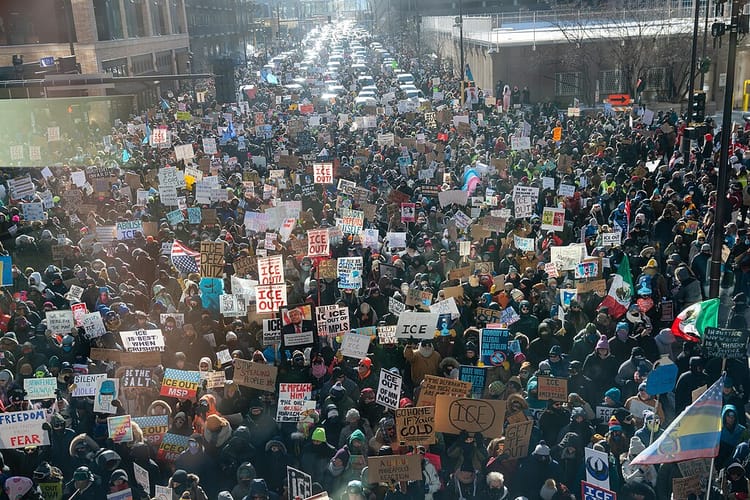The Loudest Guys in the Room: How the Fossil Fuel Industry Warps the Information Ecosystem
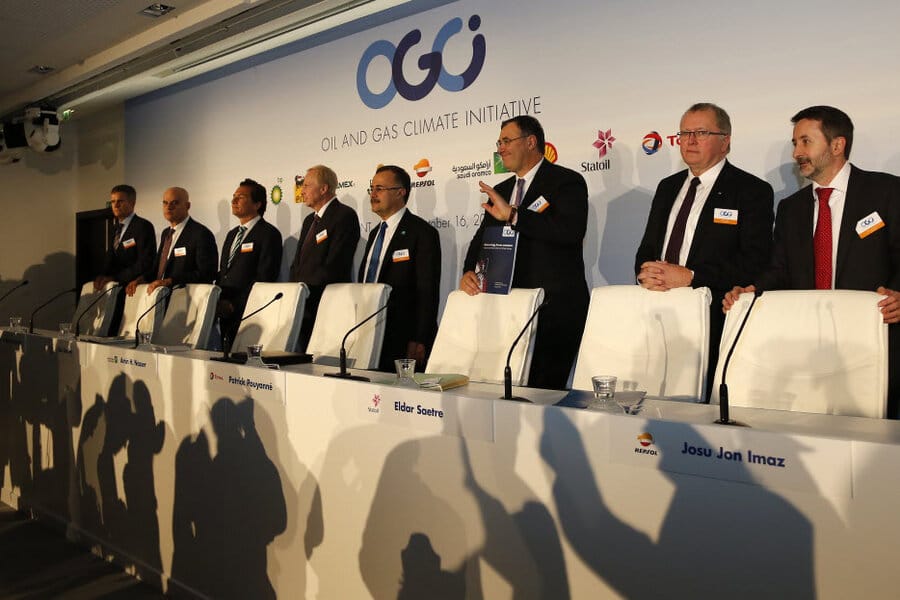
The Drilled team has been busy this week! We've put out six major stories across as many days:
- Research or Lobbying? New Documents Reveal What Fossil Fuel Companies Are Really Paying for at Top Universities - Molly Taft's deep dive into what a new tranche of documents from the bicameral investigation into fossil fuel disinformation tells about how and why Big Oil invests in university research.
- Information Pollution: A Primer - An explanatory piece we first published a few years back, but updated in light of this week's hearing on fossil fuel disinformation. Because of course every time fossil fuel disinfo is in the media, the idea that "Big Oil is copying Big Tobacco's playbook," gets trotted out and I get annoyed.
- Senate Democrats Step Up Pressure on Big Oil - The first (and hopefully not last!) Drilled piece from the great Rebecca Leber, who covered this week's hearing for us.
- On LNG, the Opportunity for an “Exxon Knew” Do-Over - A deep dive into what these new documents tell us about what oil companies know about LNG and how it contradicts what they're saying publicly and what they're lobbying for.
- In Backlash to Campus Pro-Palestine Protests, Echoes of Standing Rock and the Global Crackdown on Climate Protest - A genius feature from Alleen Brown, connecting the dots between the global crackdown on climate protest and the violent response to campus protests across the U.S. this week, making her case with stunning new Standing Rock documents (co-published with the Center for Media and Democracy)
- How the Oil and Gas Industry Smuggles Corporate Propaganda into Schools - The culmination of a couple years' worth of digging into Discovery Education, one of the fossil fuel industry's favorite partners on educational curricula, a terrific Molly Taft piece co-published with Rolling Stone.
Our reporting even got a mention in the video Senate Dems and House Oversight Dems made to walk the public through the investigation, right around the 3-minute mark when they're talking about the amount of money Exxon invested in advertising its algae-based fuels program versus actually researching how to make algae biofuels a reality.
I list it all out here not just because I'm so proud of the breadth and depth it showcases from our small but mighty team, but also because it's a great illustration of exactly what we're talking about when we talk about climate disinformation, or as we've taken to calling it "information pollution." Why information pollution? Because we're not just talking about particular misleading myths, we're talking about how the industry shapes information from jump, warping everything from data to university research, elementary school curricula to whose protest is considered a terrorist threat.
There's one document I keep thinking about, a 2017 strategy that the global PR firm Brunswick came up with for BP. It was actually published back in 2022 with the first round of documents from the House Oversight Dems/Senate Budget Committee investigation into fossil fuel disinformation, but removed from public as soon as Republicans took over the House. [We've preserved those documents here, for the record.] It starts with the goal: "Advance and protect the role of gas — and BP — in the future of energy conversation."
Then it lays out a plan for, in effect, creating the facts and, beyond that, the illusion of facts, that can be used to shape the impression key stakeholders have of gas.
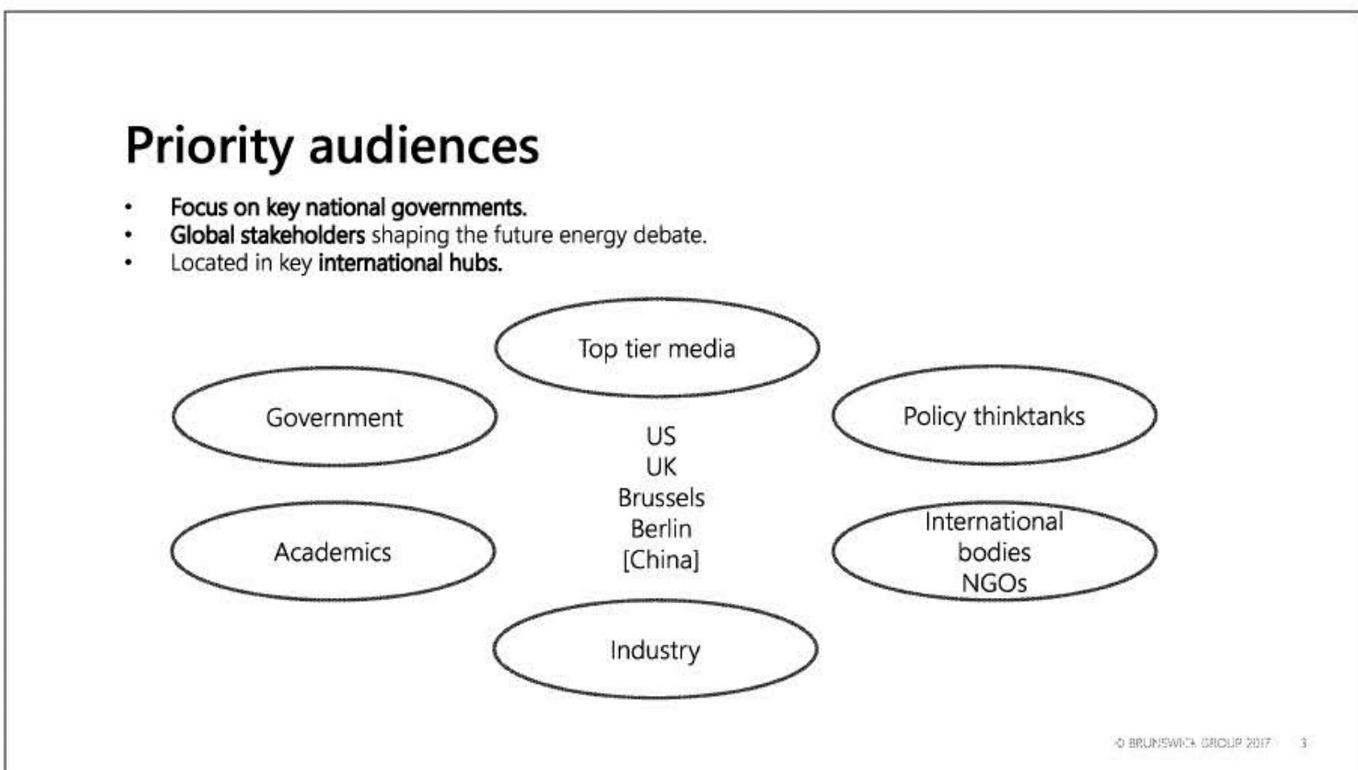
The plan notes key challenges that this campaign will have to overcome as well. And by "challenges" they mean reality. What are the actual facts of gas that they will need to change--or change the perception of--in order to accomplish their goal of securing a future for both gas and BP? First, gas generates fewer carbon emissions than coal, but Brunswick points out, it is still a fossil fuel. Then there's the fact that renewables have dominated the conversation around energy transition. And finally, there's the methane problem. Or as Brunswick puts it, "emergence of methane as a flash point for gas." A lobbyist for BP put it more bluntly in an email around the same time, describing methane emissions as "a problem that is not going away" for gas.
Finally, Brunswick gets to the solution, its strategy for warping information and perspectives on gas in BP's favor. First, continue to emphasize the carbon benefits of gas by talking about the transition from coal to gas (never mind that, increasingly, gas is replacing...other gas, not coal). Then, position gas as a partner, not a competitor, to renewables (although from an infrastructure perspective they are almost always in competition). And finally, take a leading role on reducing methane emissions (but, crucially, do so while continuing to focus attention on carbon--because of course if methane is your problem, you want everyone focused on CO2). But how will BP accomplish these goals? Brunswick suggests the company "contribute to the debate," and key to that endeavor is the need for "new data into public domain with partner." Which partner(s), pray tell? Well, Princeton University of course, where BP has long funded the Carbon Mitigation Initiative and where, as Molly pointed out in her piece this week, the company has a "synergistic" relationship with researchers.
But contributing to the debate doesn't end with funding new university research that backs up their opinion, Brunswick suggests that BP also consider partnering up with Environmental Defense Fund or science and tech organizations on a "high tech story" focused on satellites gathering data on methane emissions and on "action on the ground" messaging about how the industry is managing methane emissions. It's hard to avoid thinking about that slide amidst discussions of the U.S. EPA's new methane rule and how satellite monitoring will or won't help to enforce it. The underlying message here is that if you can make it look like you're doing something about the problem—by studying it and monitoring it—that's generally enough to convince people that you're actually doing something about the problem, which has historically been enough to keep regulation at bay.
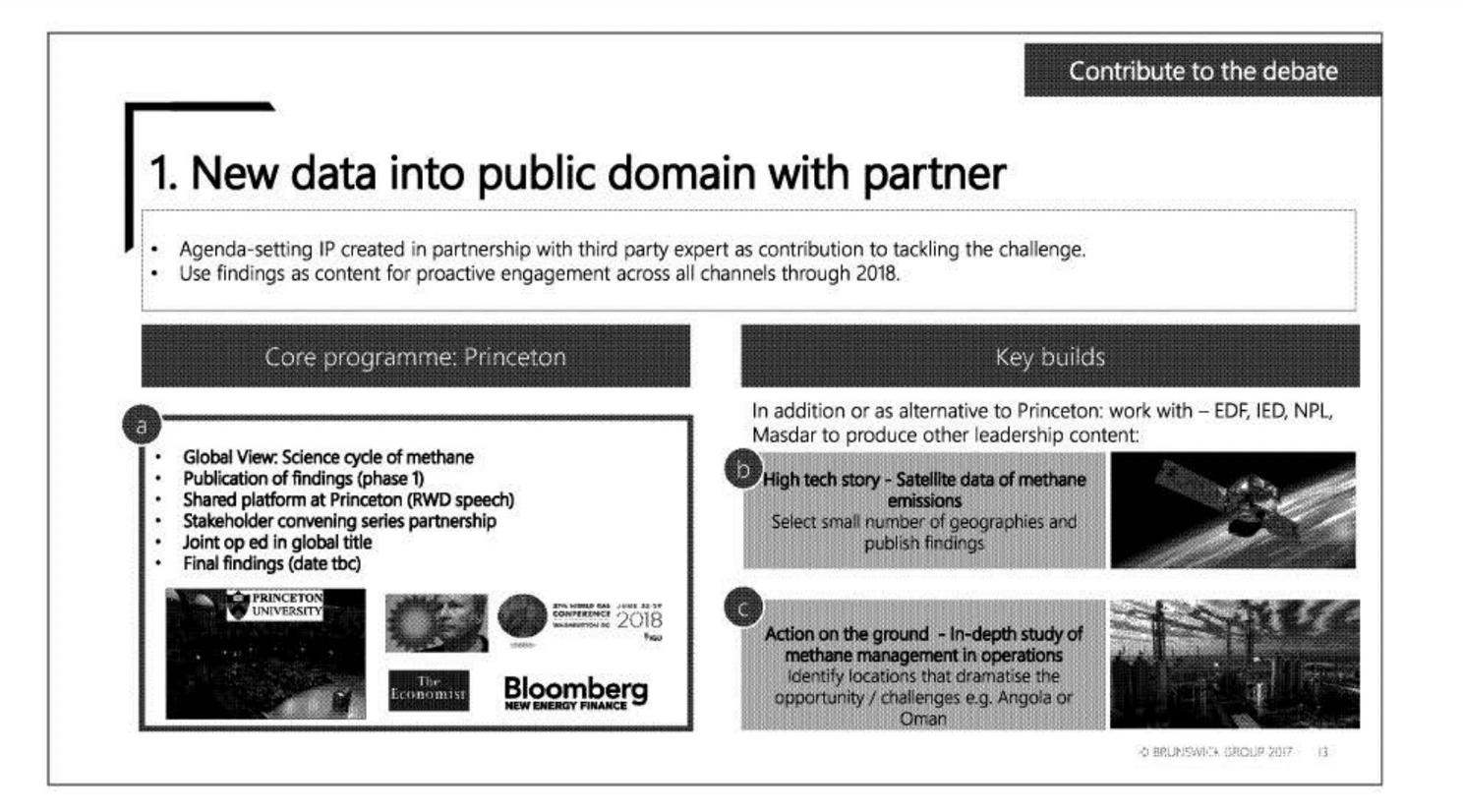
Once you've got new information to share, the next step is to get it out to the masses, and here again Brunswick suggests that BP lean on its relationship with Princeton, recommending round tables and events with Princeton alone and with Princeton alongside a preferred media partner, like the Financial Times. It also recommends a circuit of conference and speaking engagements for top executives, with corresponding top-tier media hits, for example a Washington Post op-ed, CNBC Power Lunch, and Facebook Live Q&A that all coincide with an exec speaking at a major energy conference.
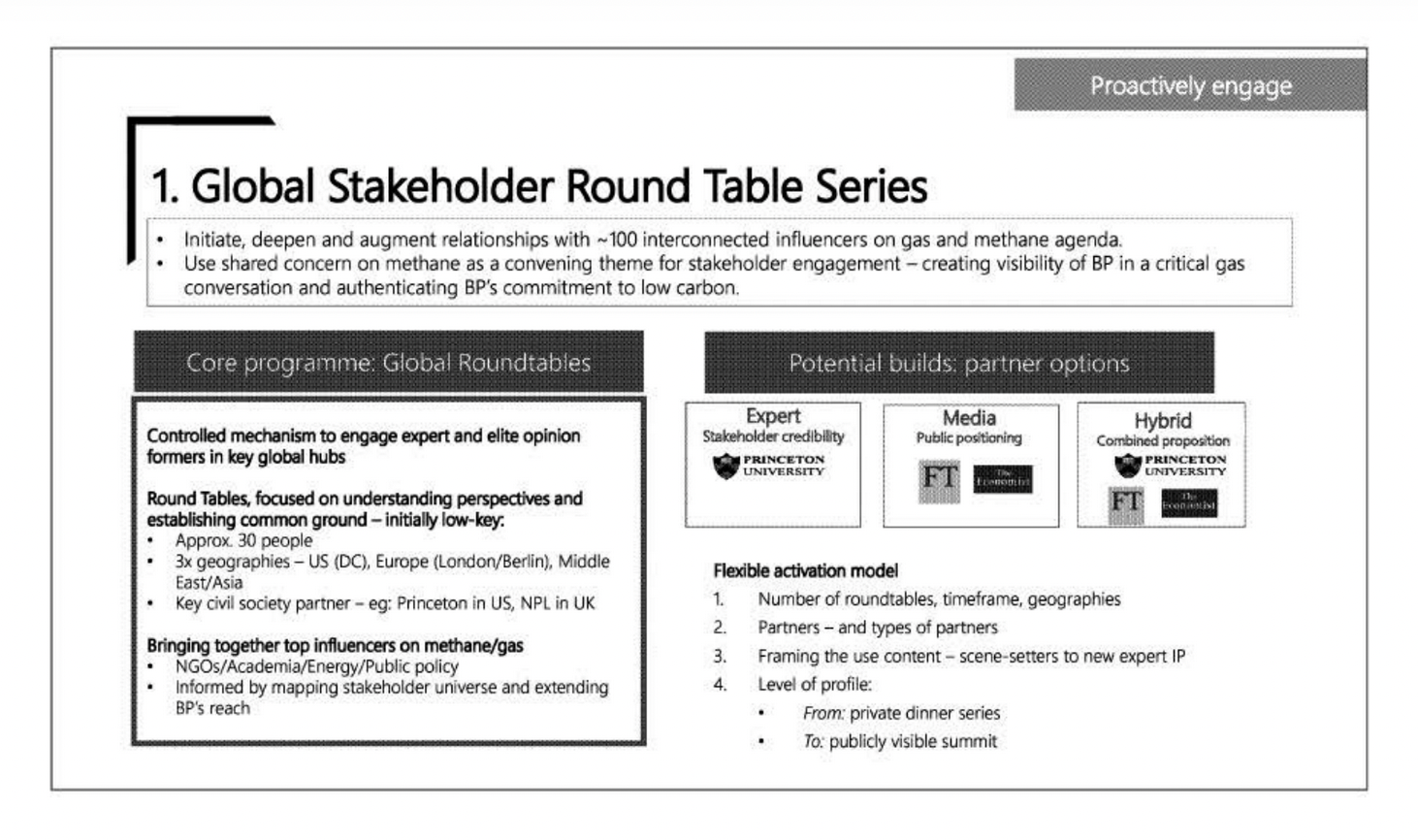
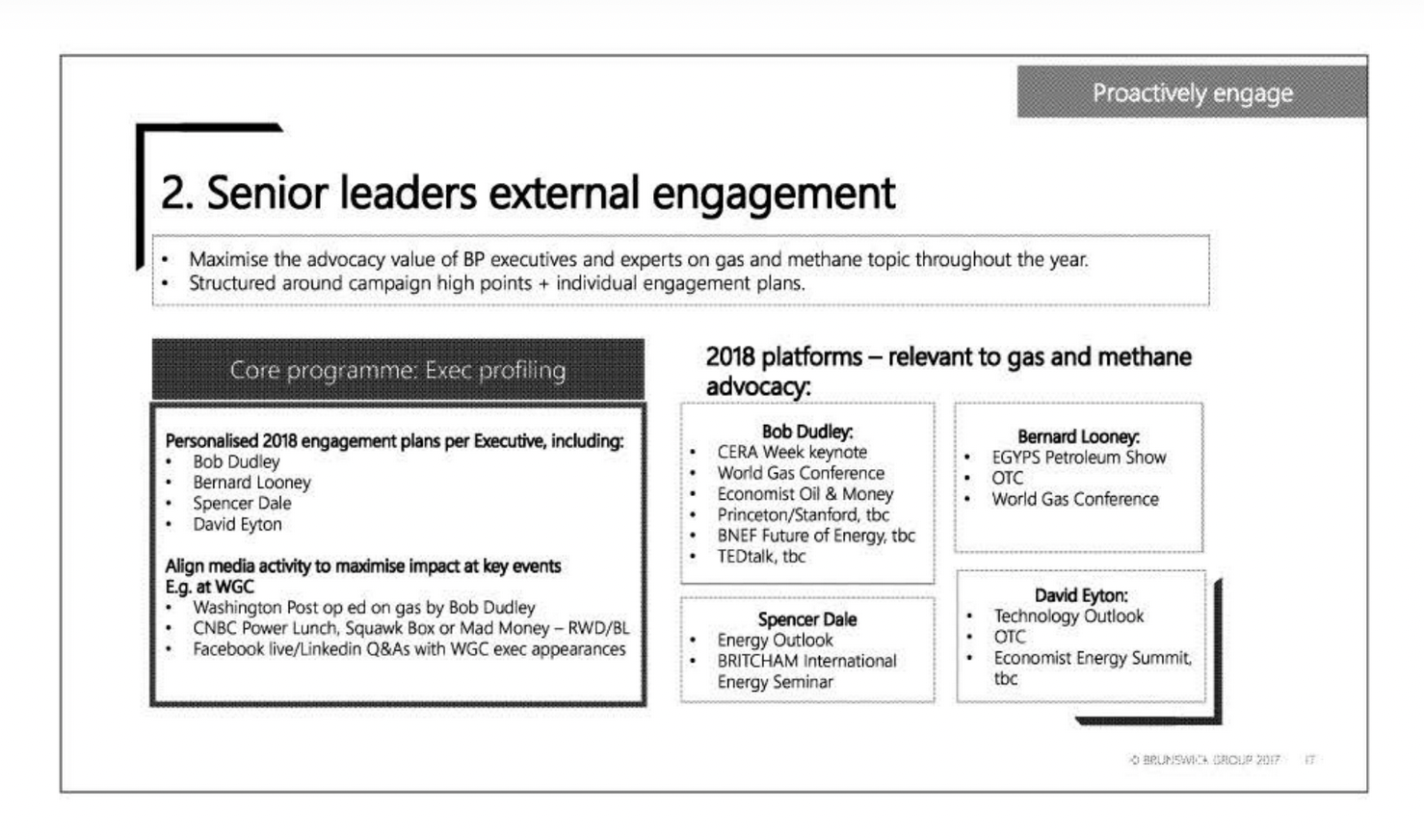
Underpinning all of this, of course, is also a robust corporate surveillance strategy that helps both the the oil company's execs and those at its PR firm keep on top of what activists, journalists, and others are saying about gas and respond instantly. We know this from the recent documents, too. In a September 2021 alert sent to the American Petroleum Institute, the largest U.S. trade group for the fossil fuel industry, a surveillance company called Command CG notes: "there is a demonstration scheduled to occur at the U.S. Capitol at 4 pm today by the group Peoples Watch in support of the Green New Deal. Both the Sunrise Movement and ShutDown DC are involved in the demonstration and have been in the area of the Capitol for most of the day."
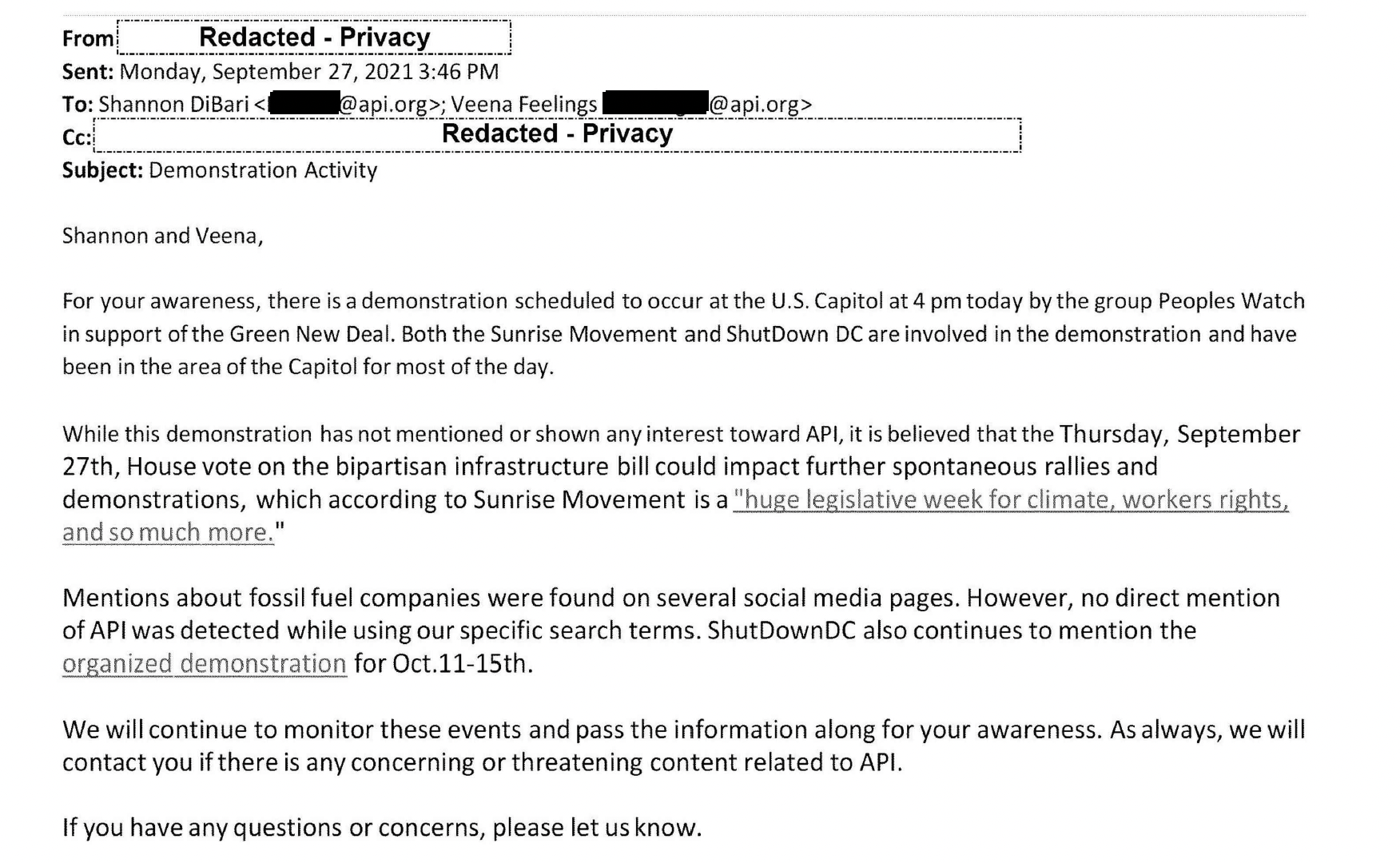
What it all shows is something we talk about a lot here at Drilled, that it's not just climate denial or science misinformation, but the wholesale hijacking of how we think of these issues, from really basic perceptions of the environment and the economy to specifics on how best to deal with methane emissions.
All this great reporting takes a lot of time and effort! If you're able to, please consider supporting our work.
This Week's Climate Must-Reads
In addition to the six stories linked above, of course! Here's what else we've been reading this week:
- ‘Everything’s on fire’: Inside the nation’s failure to safeguard toxic pipelines, by Mike Soraghan for Politico - The pipeline inspection process in the U.S. is effectively an industry scam, and Soraghan has the receipts.
- How divestment became a ‘clarion call’ in anti-fossil fuel and pro-ceasefire protests, by Dharna Noor for The Guardian - An excellent piece connecting the dots between fossil fuel & anti-war divestment on U.S. campuses.
- [Study] The carbon dioxide removal gap, by William Lamb et al in Nature - Most scientists agree that carbon-dioxide removal will be necessary if we want to limit warming to less than 2 degrees; this paper finds that no country is currently meeting its CDR commitments.
- ‘It’s going to be messy’: advocates balance climate action and conservation amid Queensland’s green energy boom, by Graham Redfearm for The Guardian Australia - Really appreciate Redfearn's grappling with the complexities and nuance here around how to balance energy transition and conservation goals.
- A Long, Hot Summer Set to Worsen Conditions in Gaza, by Fares Alghoul and Eric Roston for Bloomberg – An excellent example of how to report the intersection between the war in Gaza and climate change. Here, Roston delivers the gut-punching news that "nighttime heat is especially dangerous for displaced Palestinians with no way to cool down."


